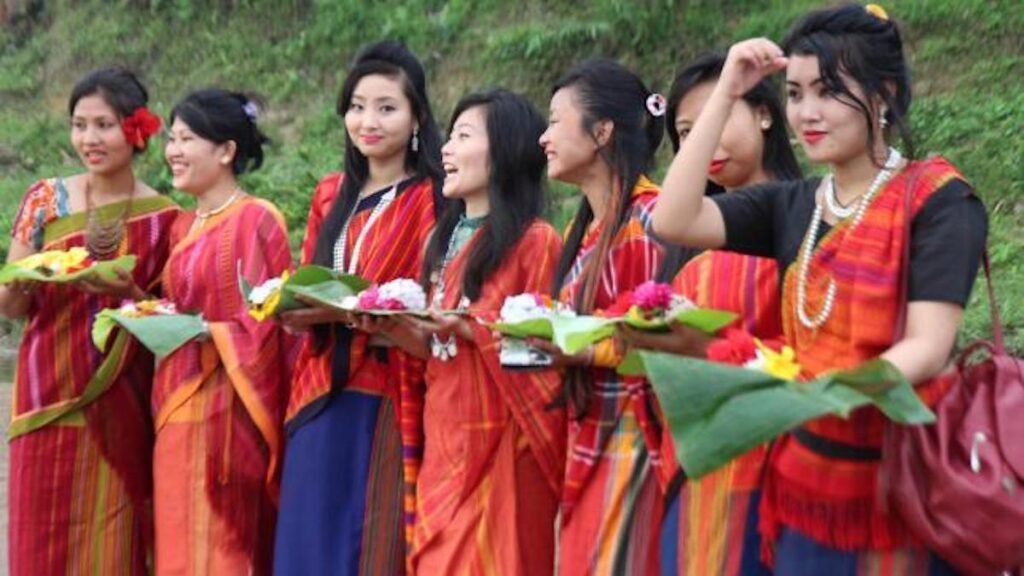Why in news?
Recently, the Ministry of Home Affairs and Arunachal Pradesh were directed by National Human Rights Commission (NHRC) to submit action taken report against alleged racial profiling and resettlement of the Chakmas and Hajongs from the State within six weeks.
- It is also directed to both the authorities that “to ensure the human rights of the Chakmas and Hajongs were protected by all the ways”.
- Members of the two communities have reportedly been victims of police atrocities, hate crime and denial of rights and beneficiary programmes.
Key Points-
- The Supreme Court directed the State to grant them citizenship in 2015, but the order had not yet been executed.
- The Supreme Court in a judgment in 1996 had stated that the “life and personal liberty” of every Chakma residing within the State shall be protected.
- In view of these orders and given that most of the Chakma and Hajong community members were born in the State and they are living peacefully. In August 2021, the Chief Minister of Arunachal Pradesh announced that the communities would be relocated outside the State for their census, the statement was clearly unjustified.
- Then Chakma Development Foundation of India (CDFI) asked for the urgent intervention of the NHRC against racial profiling of 65,000 Chakma and Hajong tribals of Arunachal Pradesh through illegal census which was scheduled to begin from 31st December, 2021 for their deportation/expulsion or relocation from the State. Afterwards plan of census was dropped.
- Racial profiling is the process or activity of the government or police that involves using people’s racial and cultural characteristics to identify people to investigate.
Issues with the Special Census-
Chakma organisations considered the census as violation of Article 14 of the Constitution of India and Article 1 of the International Convention on Elimination of Racial Discrimination that is ratified by India, because the census is nothing but racial profiling of the two communities based on to their ethnic origin.
- Article 14 of the Constitution of India provides for equality before the law or equal protection of the laws within the territory of India that is the State shall not deny to any person equality before the law or the equal protection of the laws within the territory of India
- In October 1966, The United Nation General Assembly declared 21st March as the international Day for the Elimination of Racial Discrimination and it is commemorated annually.

Who are the Chakmas and Hajongs?
- The Chakmas and Hojongs of Arunachal Pradesh are migrants from the chittagong Hill tracts of (former East Pakistan) Bangladesh.
- The Chakmas and Hajongs, originally residents of the chittagong Hill Tracts, displaced due to construction of Kaptai dam on the karnaphuli River in the 1960’s and sought asylum in India (Southern and south-eastern parts of Arunachal Pradesh from 1964 to 1969).
- Presently, Buddhist Chakmas have considerable population in Mizoram and Tripura while the Hindu Hajongs mostly settled in the Garo Hills of Meghalaya and adjoining areas of Assam and a large number of their population lives in the changlang district of Arunachal Pradesh.
- Under Citizenship Act, 1955, Out of the 65,000 Chakmas and Hajongs, nearly 60,500 are citizens by birth under Section 3 of the act, after having been born before 1st July 1987 or as descendants of those who were born before this date.
- The Citizenship (Amendment) Act of 2019 amended two sections of the Citizenship Act 1955 has nothing to do with the Chakma and Hajongs as they were permanently settled by the Union of India in the 1960s.
- The Inner Line Permit mandatory under the Bengal Eastern Frontier Regulation of 1873 which provides permission for outsiders to visit the State does not apply to them because 95% of the migrants were born in the North-East Frontier Agency (NEFA) or Arunachal Pradesh.
National Human Rights Commission (NHRC)-
- The National Human Rights Commission (NHRC) of India was established on 12 October, 1993.
- NHRC is a statutory body established by the Government of India under the Protection of Human Rights Act, 1993 for the protection and promotion of human rights.
- Headquarter- New Delhi.
- Protection of Human Rights Act, 1993 made provisions for the establishment of State Human Rights Commissions.
- The Chairperson and other members of the NHRC are appointed by the President of India. It consist the chairperson and five members.
- Chairperson- who has been a retired Chief Justice of India or a Judge of the Supreme Court.
- One member who is or has been a Judge of the Supreme Court of India and one member who is or has been the Chief Justice of a High Court.
- Three Members, out of which at least one shall be a woman to be appointed from amongst persons having knowledge or practical experience in matters relating to human rights.
- The Chairperson or the Members of the NHRC holds office for a term of 03 years or until they attain the age of 70 years, whichever is earlier.
